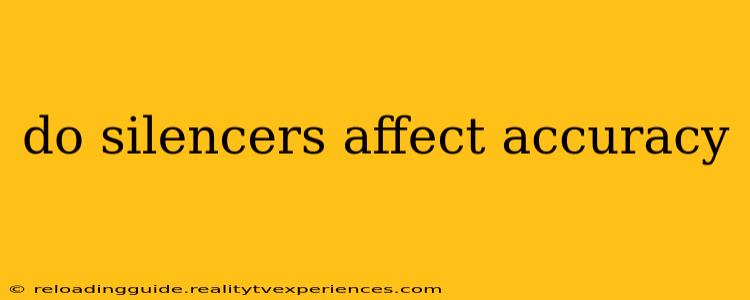The question of whether silencers (also known as suppressors) affect accuracy is a common one among firearm enthusiasts and newcomers alike. The short answer is: it depends. While a suppressor's impact on accuracy is often negligible, several factors can influence its effect on your shot grouping. Let's delve into the specifics.
Understanding the Mechanics of a Suppressor
Before addressing accuracy, it's crucial to understand how a suppressor works. It doesn't make a firearm silent, but rather reduces the sound of the gunshot by diverting and dissipating expanding gases. This is achieved through a series of baffles within the suppressor's cylindrical body. These baffles redirect and slow down the propellant gases, significantly lowering the decibel level.
Factors Affecting Accuracy with a Suppressor
Several factors determine the degree to which a suppressor affects the accuracy of a firearm:
1. Suppressor Design and Quality:
- Baffle Design: High-quality suppressors with precisely engineered baffles are less likely to impact accuracy. Poorly designed baffles can introduce inconsistencies in gas flow, potentially affecting bullet trajectory.
- Material and Construction: The materials used in suppressor construction, such as stainless steel or titanium, impact its durability and weight distribution. A well-built suppressor will maintain better balance and contribute to consistent accuracy.
- Mounting System: A secure and properly fitting mounting system is vital. Loose or misaligned suppressors can lead to accuracy issues.
2. Ammunition Type:
- Caliber: Larger calibers generally produce more gas and recoil, potentially making the impact of a suppressor on accuracy more pronounced. Smaller calibers often see minimal changes.
- Ammunition Quality: Using high-quality, consistent ammunition is crucial for accuracy regardless of whether a suppressor is used. Inconsistent ammunition can exaggerate any minor accuracy changes caused by the suppressor.
3. Firearm Characteristics:
- Barrel Length: A shorter barrel can experience a more noticeable accuracy shift with a suppressor due to increased back pressure. Longer barrels generally accommodate suppressors with less accuracy impact.
- Firearm Type: The design of the firearm itself influences the suppressor's effect. Some firearms inherently have tighter tolerances and better inherent accuracy, minimizing the suppressor's influence.
4. Point of Impact Shift:
It's common for a suppressor to cause a slight shift in the point of impact (POI). This means that after attaching the suppressor, your bullets may hit slightly higher, lower, left, or right compared to before. This is usually a minor adjustment that can be corrected through sight adjustments.
Minimizing Accuracy Issues with a Suppressor
Several steps can be taken to minimize any potential negative impact on accuracy:
- Proper Mounting: Ensure your suppressor is correctly and securely mounted to avoid misalignment.
- Zeroing with Suppressor: After installing the suppressor, always re-zero your sights or optic to compensate for any POI shift.
- High-Quality Suppressor: Invest in a high-quality suppressor from a reputable manufacturer known for precision engineering.
- Consistent Ammunition: Always use consistent, high-quality ammunition for optimal results.
Conclusion: Silencers and Accuracy – The Verdict
While a suppressor can introduce a minor shift in point of impact, it rarely significantly degrades a firearm's inherent accuracy. The impact depends significantly on the quality of the suppressor, the type of ammunition used, and the characteristics of the firearm itself. With careful attention to these factors and proper zeroing, the impact on accuracy is usually minimal and easily correctable. For most shooters, the benefits of noise reduction outweigh any slight impact on accuracy.

